We need to talk about antisemitism. If we don’t, it is simply going to continue to be used as a ‘weaponised term’ to shut down free speech and outlaw any and all who dissent against the status quo. The term has been co-opted and abused, not by those who care about equality and justice for Jewish people, but rather by those who wish to engage in censorship. Antisemitism is being shamelessly exploited by the establishment to form the basis of a global witch-hunt for all who question the financial, political, social and cultural orthodoxy.
Genuine antisemitism is indefensible. To think that the world’s ills are all ‘caused’ by one group of people is moronic. Not only is it without any substantiating evidence, contrary to historical fact and based upon nothing other than poorly informed bigotry, it is simplistic to the point of puerility. Jewish history is punctuated by numerous examples of brutal oppression, state sanctioned murder and vile persecution by idiots who believed this tripe. The Holocaust was one of the worst episodes in human history and Jews have just reason to strongly defend their faith, culture and values.
Therefore, accusing someone of antisemitism is a very serious allegation and should not be done injudiciously. To allege that someone is antisemitic without good reason is not only offensive for the person falsely accused but, far more importantly, it belittles the true meaning of the term and shows an appalling lack of respect for Jewish history.
The recent Tree of Life Synagogue shooting, which cost the lives of 11 people, was allegedly carried out by a man with deeply held antisemitic views. 46 year old Robert Bower supposedly wrote a number of antisemitic tropes on numerous social media platforms, including the independent, free speech, social network Gab. This resulted in Gab losing its hosting and having its access to funding withdrawn by PayPal and others. However, I suggest there is more to the Gab take down than you might think.
Gab has been called a haven for antisemitic ‘hate speech’ and there were undoubtedly some anti-Semites using the platform. However there are anti-Semites on every social media network. Gab is not unique in that respect. The founder of Gab, Andrew Torba, strongly defended his platform saying:
“We will exercise every possible avenue to keep Gab online and defend free speech and individual liberty for all people.”
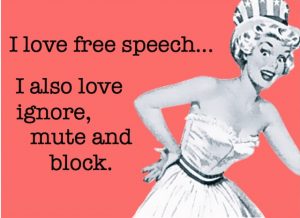 Gab’s defence of free speech has prompted a vitriolic reaction by many who firmly believe people should not be allowed to say, and by extension, ‘think,’ anything deemed to be antisemitic. So it is crucial that we are all clear about the agreed definition of what constitutes antisemitism.
Gab’s defence of free speech has prompted a vitriolic reaction by many who firmly believe people should not be allowed to say, and by extension, ‘think,’ anything deemed to be antisemitic. So it is crucial that we are all clear about the agreed definition of what constitutes antisemitism.
The International Holocaust Remembrance Alliance (IHRA) give the following definition:
“Antisemitism is a certain perception of Jews, which may be expressed as hatred toward Jews. Rhetorical and physical manifestations of antisemitism are directed toward Jewish or non-Jewish individuals and/or their property, toward Jewish community institutions and religious facilities.
…….Manifestations might include the targeting of the state of Israel, conceived as a Jewish collectivity. However, criticism of Israel similar to that leveled against any other country cannot be regarded as antisemitic”
This seems reasonable enough to me. However, the IHRA then agreed to add 11 ‘working examples’ of antisemitism which include:
“Accusing Jewish citizens of being more loyal to Israel, or to the alleged priorities of Jews worldwide, than to the interests of their own nations.”
[sociallocker id=”2285″] [/sociallocker]
There is a significant free speech problem with this example. It seems to be suggesting that it is ‘antisemitic’ to question the loyalty of an individual. This is contrary to the principle of permitting ‘criticism of Israel similar to that levelled against any other country.’
If it were discovered that an elected official was a Russian spy, surely questioning their loyalty would be key both to uncovering their espionage and prosecuting them. Equally, in such a case, Russia would be accused of spying. If this definition, offered by the IHRA, is adopted into law, it seems it may be impossible to investigate possible Israeli espionage because the investigation itself would be deemed antisemitic. A ‘hate crime.’
This idea of never questioning a person’s loyalty also appears to shut down certain criticisms of the ‘war on terror.’ The political ideology of Zionism was arguably influential among some Key architects of the policy to wage war in the Middle East. For example Richard Pearle and Paul Wolfowitz, both avowed Zionists, were among the many Neocons in the Bush administration who held dual U.S – Israeli citizenship and were influential in the formation of the policies that underpinned the ‘war on terror.’
In 1982 the Yinon Plan for a Greater Israel advocated the breaking up Arab States into smaller enclaves, divided along sectarian lines. It stated:
“The dissolution of Syria and Iraq into ethnically or religiously unique areas such as in Lebanon is Israel’s primary target on the Eastern front.…..An Iraqi-Iranian war will tear Iraq apart and cause its downfall..….Every kind of inter-Arab confrontation will assist us in the short run and will shorten the way to the more important aim of breaking up Iraq.”
The parallels between this Zionist commitment to ‘balkanise’ the Middle East and the U.S led coalition’s war in Iraq, and its subsequent support for terrorist groups in Syria, are notable. Therefore it is a legitimate question to ask whose agenda the Zionist Neocons served in relation to recent geopolitical events. Under the IHRA definition the logical exploration of the facts would also be considered antisemitic.
This is not tenable. There appears to be a strain of thought that criticism of Zionism is intrinsically antisemitic. The argument being that without Zionism Israel would not exist, therefore criticising Zionism is tantamount to denying Israel’s right to exist.
However, placing the political ideology of Zionism into some sort ‘protected status’ seems absurd. For a start, modern day Zionism is very much concerned with Israeli expansionism. It is not simply about maintaining Israel’s integrity but rather about expanding its territory. This clearly implies the need for further military conquest. Criticism of Zionism, and those who promote it, has nothing to do with bigotry against Jewish people. It is a geopolitical debate.
Nor is Zionism a universal political ideology of the Jewish people, despite numerous claims to the contrary. Many of its harshest critics are, and have long been, Jews. Zionism does not go unchallenged within either Israel or the Jewish diaspora. Its ideological home is found in the Likud Party, currently led by Benjamin Netanyahu. The claim by some that there is absolute philosophical unity between the political ideology of Zionism and theology of Judaism is nonsensical. To suggest that Zionism ‘represents’ the Jews is to ascribe a single political ideology to an entire people. Which is cultural stereotyping. Antisemitic in other words.
The Policies of Zionism Are Not ‘Jewish’
Another significant suggested IHRA example of antisemitism is:
“Denying the Jewish people their right to self-determination, e.g., by claiming that the existence of a State of Israel is a racist endeavour.”
Recently Israel passed the Nation State Law. This included the following clauses:
‘The state of Israel is the nation-state of the Jewish people, in which it fulfills its natural, religious, and historic right to self-determination.’
‘The fulfillment of the right of national self-determination in the State of Israel is unique to the Jewish people.’
Anyone who cares about racial equality should be concerned by this part of the Israeli Nation State law. A recent statistical analysis commissioned by the Jewish Virtual Library stated the following demographic distribution:
“The Jewish population makes up 6,625,000 (74.4%); 1,864,000 (20.9%) are Arabs; and, those identified as “others” (non-Arab Christians, Baha’i, etc) make up 4.7% of the population (418,000 people).”
So more than quarter of the population of Israel are not Jewish. Therefore claiming that Israel is the nation state of the Jewish people and that only Jewish people have the right to national self-determination would seem to exclude 25.6% of the Israeli population.
The law also states:
‘The state will be open for Jewish immigration and the ingathering of exiles.’
While there is absolutely nothing wrong with allowing, or encouraging, Jewish immigration this law indicates, by omission, that Israel is less open to immigration from other nationalities or ethnic groups.
Imagine if the UK passed a nation state law that read “……the UK is the nation state of the Anglo-Saxon people.” I suggest there would be uproar. People would legitimately claim, under such legislation, the existence of the UK was a racist endeavour. However, if the IHRA definition is adopted into law, you could not say the same about Israel, because it would be deemed antisemitic. This is illogical.
Israel’s adoption of the Nation State Law has brought sharp criticism from across the globe. Perhaps most notably from the institutions of the European Union. The debate centers upon allegations that the Nation State Law is inherently racist. The Nation State Law supposedly describes the fundamental principles of the Nation State of Israel. However the IHRA definition defines “claiming that the existence of a State of Israel is a racist endeavour” is antisemitic. Therefore, potentially, all such criticisms could easily be prosecuted as ‘hate speech’ in a court of law.
How would the world ever have brought international pressure to bear upon the former apartheid state of South Africa if the mere suggestion that it was based upon Afrikaans’ exceptionalism was illegal?
What about those who think Israel’s Operation Protective Edge was little more than the slaughter of more than 2000 innocent Palestinians?
Because Israel are not the only nation on Earth to have committed atrocities, under the IHRA definition, you cannot criticise Israel for murdering thousands of people because we must accept that doing so is antisemitic. The IHRA definition states that any criticism of Israel cannot apply…..
“……….double standards by requiring of it [Israel] a behaviour not expected or demanded of any other democratic nation.”
So it does appear any who point out Israel’s appalling human rights record or the fact they have breached more U.N Security Council resolutions than any other country on Earth are all ‘right wing extremists’ and ‘antisemitic conspiracy theorists.’
Why? Because antisemitism that’s why?
This is worrying because it seems likely that the IHRA definition will be incorporated into law. Recently the UK Labour Party, under the leadership of Jeremy Corbyn, has been under attack for alleged antisemitism. Despite resistance, Labour capitulated to lobby pressure and adopted the IHRA definition of antisemitism into its rule book. Labour could well form the next British government.
Jeremy Corbyn – Lifelong anti-racism campaigner and anti-Semite?
The current British Conservative minority government has also adopted the IHRA definition, as has the College of Policing. It seems only a matter of time until the IHRA definition becomes the ‘legal definition’ of antisemitism. At which point Israeli espionage will be protected and any, apparently justified, expression of concern that Israel is effectively an apartheid state will be illegal, under British law. Whether you accept this allegation or not, the point is the discussion itself could not proceed. People’s freedom of speech will be removed.
Across the so called free world there is mounting pressure for the firmer application of existing ‘hate speech’ laws and for tighter regulation regarding what can and cannot be said online. So what does this mean in practice?
I’m from the UK, so I will refer to the British legal definition of ‘hate speech.’ There are a number of relevant statutes which collectively form so called ‘race hate’ laws in Britain. Similar legislation exists in most democracies. We are concerned with antisemitism here, so the most relevant legal definitions in the UK are as follows:
The Public Order Act of 1986 broadly defined so called hate speech as any expressions of racial hatred against a group of persons by reason of the group’s colour, race, nationality (including citizenship) or ethnic or national origins. So promoting hate of Jews online would certainly fall within this.
However, there are some problems with this legislation that should raise alarm for anyone who values the freedom of speech and expression which, let’s be honest, is supposedly the basis for our whole democratic way of life.
Section 18 of the Public Order Act defines the illegal activity as:
A person who uses threatening, abusive or insulting words or behaviour, or displays any written material which is threatening, abusive or insulting, is guilty of an offence if—
(a) he intends thereby to stir up racial hatred, or
(b) having regard to all the circumstances racial hatred is likely to be stirred up thereby.
Firstly it suggests that proof of ‘intent’ and ‘hatred’ could secure a conviction. But an ‘intention’ is a thought, and ‘hatred’ is an emotion. Neither of them are actions which can be proven beyond all reasonable doubt with evidence (short of the defendant’s admission.)
Section 4A of the Public Order Act was then updated by The Criminal Justice and Public Order Act 1994 which, if ‘free speech’ matters to you at all, made the situation worse. This outlaws causing anyone ‘alarm’ or ‘distress.’ Both of which are entirely subjective and based upon nothing other than the opinion of the alleged victim. It states:
A person is guilty of an offence if, with intent to cause a person harassment, alarm or distress, he—
(a) uses threatening, abusive or insulting words or behaviour, or disorderly behaviour, or
(b) displays any writing, sign or other visible representation which is threatening, abusive or insulting,
…..thereby causing that or another person harassment, alarm or distress.
This is a significant threat to the principle of free speech and freedom of expression. Anyone can claim an offence has been committed as a result of their ‘feelings’ about anything they see, hear or read.
I’m no legal expert so thankfully you don’t have to take my word for it. The UK government states:
In the UK we use this definition of hate crime in general:
Hate crimes and incidents are taken to mean any crime or incident where the perpetrator’s hostility or prejudice against an identifiable group of people is a factor in determining who is victimised.
The UK Government’s overall policy is that it is up to the victim to determine whether a crime against them was motivated by any particular characteristics.
‘Hate Crime’ – Convictions Based Upon ‘Feelings.’
In a very real and legally binding sense this means that you cannot say what you think in the UK because, if someone is alarmed or distressed by whatever you have said, you could be arrested and potentially imprisoned for speaking your mind.
Thoughtcrime has been established in the UK. Self-censorship is now a necessity and it is clear that many people literally don’t know what they are ‘allowed’ to say or think. I suggest this is destabilising society and pushing people towards the political extremes. This appears to be a deliberate policy.
Hate speech legislation is antithetical to the notion of a free and open democracy. It is the kind of law we commonly associate with dictatorships. We must also ask why these laws exist, as there appears to be absolutely no need for them whatsoever.
The United Nations General Assembly signed the International Covenant on Civil and Political Rights (ICCPR) in 1976. Article 20 defined as illegal any action related to discrimination based upon race, religion, or nationality which ‘incites’ anyone to commit a crime. Every Western democracy, and most other countries around the world, have either formed ‘incitement’ laws or already had similar in-place prior to the ICCPR declaration.
It has long been against the law to encourage anyone to commit a crime either verbally or in writing in the UK. Calling for all English people to be killed or Russians to be whipped is illegal and has been for decades, if not longer. Therefore, regardless of so called ‘hate speech’ legislation, if some unhinged loony calls upon his fellow nutters to ‘kill the Jews,’ he has committed the crime of incitement.
Incitement Is Illegal Online
In fact ‘incitement’ in the UK (until the Serious Crime Act 2007) was a common law offence. The Incitement to Disaffection Act 1934 and Incitement to Mutiny Act 1797 are both examples of UK statutes based upon this common law principle. Freedom of speech in parliament and their duty to protect individual rights were first enshrined in British law in the 1689 Bill of Rights. The negative right (the obligation of the state not to infringe your rights) to uphold freedom of speech is another common law principle.
Given that ‘incitement’ carries far stiffer penalties and longer custodial sentences than ‘hate speech’ it amazes me that people today seem so keen to call for the application of law which is far less punitive than the alternatives which predate it.
I suggest this may be because people have been widely misled by the mainstream media into believing there is no law to stop people inciting criminal acts, such as assault, online. However, if they checked their facts they would soon find out this is not, and never has been, the case. When you add in libel, anti-terrorism, sedition and defamation laws etc. our online protections are pretty strong.
Posing the question, why are the mainstream media (MSM) frantically trying to convince everyone they are not? Moreover, why aren’t governments pointing out this fatuous drivel for what it is?
Of course, some will say that antisemitism is so appalling it warrants its own legislative protections. I have little sympathy with this view. Anyone who seriously calls for violence to be enacted upon anyone else deserves to be convicted of incitement. There’s no need at all to single one group out as more deserving. Incitement is both illegal and immoral. Full stop!
The MSM driven, alarmist clamour for stronger ‘hate speech’ legislation is not compelled by any legal ambiguity. There is something else driving this agenda forward. Something which governments appear to be eager to promote. In order for us to identify the true reason for this concerted push to shut down freedom of speech we first need to understand why freedom of speech is important.
The philosopher John Stuart Mill effectively defined why free speech matters, most notably in his work ‘On Liberty.’
Mills considered that free speech was essential to push all arguments to their logical limit. This is vital to us, as a species, because the dialectic principle (human beings discussing opposing opinions to reach a reasoned conclusion) is one of mankind’s most powerful tools for the development of new ideas. Without the ability to freely share what we think, because certain topics are ‘off limits,’ our intellectual evolution will be stifled. Mills stated we should have:
“….absolute freedom of opinion and sentiment on all subjects, practical or speculative, scientific, moral or theological.”
Mills added suppression of freedom of speech would mean “a sort of intellectual pacification” that would ultimately erode “…the entire moral courage of the human mind.” Today many rightly refer this process as ‘dumbing down.’
I’m not suggesting that antisemitic rants have any value at all in this regard. What I am suggesting is that we need to be very careful about laws designed to limit ideas. Which is exactly how the totally unnecessary ‘hate speech’ laws could and are being used.
We have already discussed the perfectly adequate incitement principle in common law. This is in keeping with Mills ‘harm principle.’ Mills defined this as the only reasonable limit upon ‘free speech.’ He stated:
“…the only purpose for which power can be rightfully exercised over any member of a civilized community, against his will, is to prevent harm to others.”
When Mills referred to ‘harm’ he did not mean causing ‘offence’ or ‘emotional distress.’ He was referring to real, physical harm and felt context was vital in determining the nature of that harm.
He used the example of an activist printing and distributing a written allegation that corn dealers starve the poor by setting unreasonable prices. The corn dealers may be offended, upset or distressed by the allegation but, even if his business suffers as a result, he is not immediately or directly harmed by it. However, if that same activist started making those allegations and inciting an angry mob who were stood in front of the corn dealers house, he would be endangering the life of the corn dealer. Mills drew a distinction between ‘legitimate’ and ‘illegitimate’ harm.
There is no reason at all that we cannot (or should not) apply this principle to online ‘freedom of speech.’ If someone expresses an opinion which others dislike, providing they do not directly incite unlawful acts, then we have no right not to be offended. It is essential that we understand this principle.
In the case of online antisemitic tropes, such as saying “there’s a Jewish plot to enslave humanity,” there is no threat to instigate a violent attack upon Jewish people. Saying Jews should be attacked in response to this notion, is an example of ‘legitimate’ harm. There is a difference, and that’s why we’ve had incitement laws for such a long time.
It may be a bitter ‘opportunity cost’ to swallow but the alternative is a society based upon ‘hate speech’ legislation. Such a society will be unable to explore the full limit of logical debate. Something to be avoided as far as possible. As Mills said:
“If all mankind minus one were of one opinion, and only one person were of the contrary opinion, mankind would be no more justified in silencing that one person than he, if he had the power, would be justified in silencing mankind.”
If we continue to usurp the common law principle of incitement in favour of draconian ‘hate speech’ legislation we will destroy ‘free speech’ and freedom of expression. This will bring an end to intellectual rigor and freedom. The impact upon press freedoms alone would inevitably lead to tyranny.
To understand just how dangerous this concept of ‘hate speech’ censorship is, we need only look at how the false allegation of antisemitism is being abused today.
Which is precisely what we’ll do in Part 2.

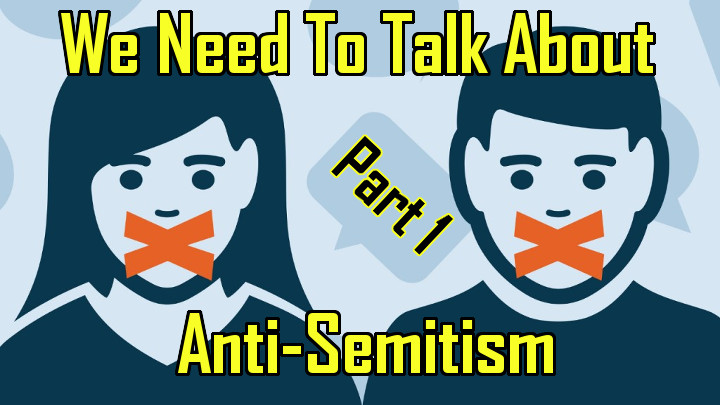
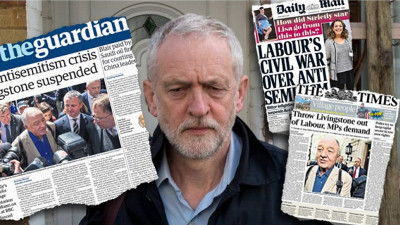
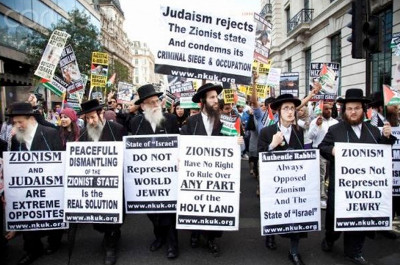
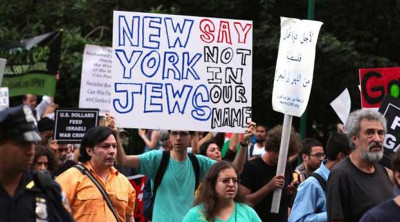
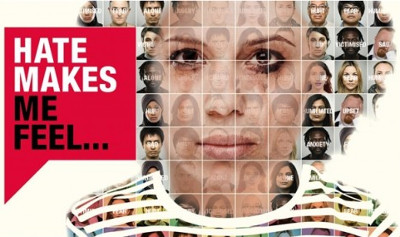

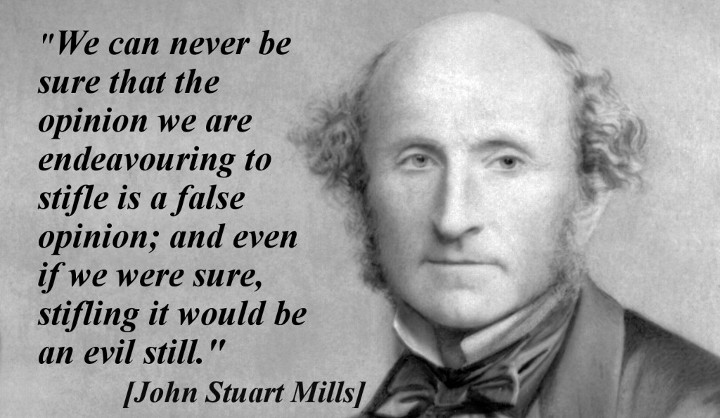

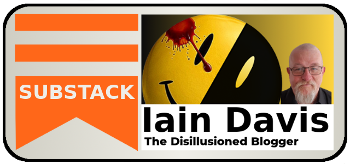




The correct definition of “Antisemitism” is “against Semites”. Semites are descendants of Shem; son of Noah. Please provide genealogical proof that jews are descended from Shem.
I think you may have missed the point of the article.